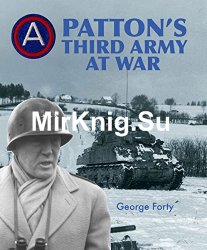|
 |
|
 |
|
|
 |
|
 |
|
 Название: The British Army during the Second World War: The History and Legacy of the Army across All Theaters of World War II Название: The British Army during the Second World War: The History and Legacy of the Army across All Theaters of World War II
Автор: Charles River Editors
Издательство: Charles River Editors
ASIN: B07HV8Q731
Год: 2018
Страниц: 128
Язык: английский
Формат: epub
Размер: 10.1 MB
Europe’s attempts to appease Hitler, most notably at Munich in 1938, failed, as Nazi Germany swallowed up Austria and Czechoslovakia by 1939. Italy was on the march as well, invading Albania in April of 1939. The straw that broke the camel's back, however, was Germany's invasion of Poland on September 1 of that year. Two days later, France and Great Britain declared war on Germany, and World War II had begun in earnest.
Of course, as most people now know, the invasion of Poland was merely the preface to the Nazi blitzkrieg of most of Western Europe, which would include Denmark, Belgium, and France by the summer of 1940. The resistance put up by these countries is often portrayed as weak, and the narrative is that the British stood alone in 1940 against the Nazi onslaught, defending the British Isles during the Battle of Britain and preventing a potential German invasion.
At the beginning of 1941, it was unclear whether the Allies would be able to remain in the war for much longer. British Prime Minister Winston Churchill had already immortalized the men of the Royal Air Force with one of the West’s most famous war-time quotes, but the potential of a German invasion of Britain still loomed. With the comfort of hindsight, historians now suggest that the picture was actually more complex than that, but the Battle of Britain, fought throughout the summer and early autumn of 1940, was unquestionably epic in scope. The largest air campaign in history at the time, the vaunted Nazi Luftwaffe sought to smash the Royal Air Force, but thankfully, the RAF stood toe to toe with the Luftwaffe and ensured Hitler’s planned invasion was permanently put on hold. The Allied victory in the Battle of Britain inflicted a psychological and physical defeat on the Luftwaffe and Nazi regime at large, and as the last standing bastion of democracy in Europe, Britain would provide the toehold for the June 1944 invasion of Europe that liberated the continent. For those reasons alone, the Battle of Britain was one of the decisive turning points of history’s deadliest conflict.
The British sought American help in North Africa, where British General Bernard Montgomery was fighting the legendary “Desert Fox,” General Erwin Rommel. At the same time, Stalin was desperate for Allied action on the European continent that could free up the pressure on the besieged Soviets. President Roosevelt had a consequential decision to make, and he eventually decided to land American forces on North Africa to assist the British against Rommel, much to Stalin’s chagrin. While the Americans and British could merely harass the Germans with air power and naval forces in the Atlantic, Stalin’s Red Army had to take Hitler’s best shots in Russia throughout 1942. But the Red Army’s tenuous hold continued to cripple the Nazi war machine while buying the other Allies precious time.
With the Axis forced out of North Africa, the Allies had freed up its North African forces for an invasion of Western Europe. Moreover, with North Africa as a potential staging around for that invasion, the Germans had to prepare for the possibility of the Allies invading not only from Britain but also from North Africa. The Allies would make that decision in early 1943.
During the first half of 1944, the Americans and British began a massive buildup of men and resources in England, while the military leaders devised an enormous and complex amphibious invasion of Western Europe. In June 1944, the Allies waited for the right weather to stage the largest, most complex invasion in military history. Throughout the summer, Allied forces advanced east along a wide front, liberating vast swaths of France and Western Europe. On August 25, 1944, the Allies finally liberated Paris.
Скачать The British Army during the Second World War: The History and Legacy of the Army across All Theaters of World War II
|
Автор: Ingvar16 1-03-2019, 13:11 | Напечатать |
Уважаемый посетитель, Вы зашли на сайт как незарегистрированный пользователь.
С этой публикацией часто скачивают:
|
|
| |
|
| |
|
 |
Patton’s Third Army at War Название: Patton’s Third Army at War Издательство: Casemate Год: 2015 Формат: EPUB Страниц: 224 Размер: 18 Mb Язык: English Patton's Third Army at... |
| |
|
| |
|
|
|
|
|
 |
|
 |
 |
|
 |
|
|
 |
|
 |
|
Посетители, находящиеся в группе Гости, не могут оставлять комментарии к данной публикации.
|
|
 |
|

|
|